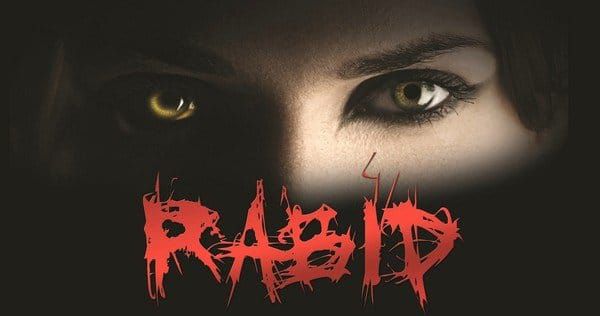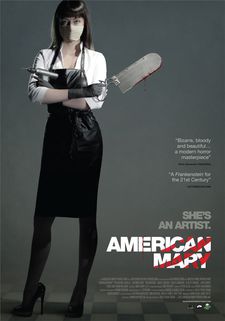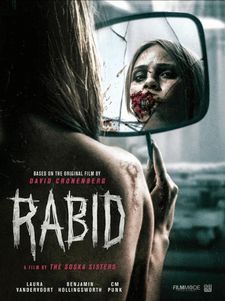 |
| Gazing into the abyss with Rabid |
The Soska sisters’ Rabid, based on the David Cronenberg film of the same name, is a spectacular choice to close this year’s Frightfest. In part one of my interview with the twin directors we discussed their love of Cronenberg’s work, their interest in society’s obsession with physical appearances and the ways in which they feel contemporary society is itself becoming Cronenbergian. In this part we discuss these themes further with a focus on some key scenes in their film and go on to talk about Frightfest itself, the wider industry and how women can and do support each other. I began by asking if they feel the film reflects their experiences of growing up as women.
“Absolutely,” says Jen. “That’s another theme that we kind of brought back from American Mary. We’re revisiting a lot of the conversations that we started there. And I don’t think people realise how difficult it is to be a woman in this society, even though we talk about it all the time, and you really get to see Rose’s struggle but maybe not as obvious, more subtle, is Chelsea’s struggle, the struggle of the beautiful girl. She’s gotten into drug habits, she’s drinking a lot, you never see her eat. She’s in the same outfit overnight. You can tell that she’s working really, really hard and the girls that she’s hanging out with at the beginning, that cause trouble with Rose, are not kind people.
 |
| American Mary poster |
“And this is in a feminine industry. That’s part of the reason why we set it against the fashion backdrop because so often feminism and things that are seen as feminine are seen as weak and a place where weak people go, but the fashion industry is like a war zone. If you don’t have what it takes then you have to get the hell out. Even the most beautiful people aren’t beautiful enough to work in fashion. It’s devastating.”
“With the three main characters – Rose, Chelsea and Brad – there’s a lot of gender roles,” says Sylvia. “Not only when we were developing those characters and creating them but it was interesting, there was a lot of pushback. A lot of people said ‘Rose has to be this sexual deviant,’ and I was like, well, that sounds like an outsider perspective on women’s sexuality where that’s kind of what you’re hoping but it doesn’t have the integrity or the emotion or the real experience of why somebody would act like that.
“With Rose and Chelsea everyone was like ‘Well, they shouldn’t get along because one’s prettier.’ No! I don’t think you understand the nuances of female relationships. Because I existed in a relationship with my sister my whole life. Every film we do has a close relationship like that because you don’t see women supporting each other in film enough. It’s almost like you assume these nasty things are going to happen.
“And then there’s Ben Hollingsworth who plays Brad, and Brad is such an interesting character. I don’t want to give away too much but the whole film is about perspective and how you look at things in a pretty package and you just go and you sign off and you ay ‘That’s totally fine. that’s great,’ and you don’t see the really clear red flags all around you. And just to keep it simple, every time there’s a red flag, there’s the colour red that comes into Rose’s world, until there’s so much red she can’t do anything about it.”
“We excuse terrible behaviour from beautiful people,” says Jen. “And I’m not sure why. I think it might be something in our species survival brain at some primal level that says ‘Oh, they might make a good mate so we shouldn’t piss them off,’ but, you know, you see the examination of a lot of beautiful people on the surface that are very ugly underneath.”
“One of our favourite scenes is the #MeToo type scene that happens on a movie set,” says Sylvia, “because I’ve worked in the movie industry since I was seven years old and I always saw this horrible behaviour and it was accepted and kept being accepted and people kept ignoring it so in the scene where you see the outbreak you see how far it goes before somebody goes ‘Oh wait, is there a problem? Should we do something?’ Because we live in such a rabid society. We just go around excusing poor mental health when we should be really looking at it and finding out how that person got there.”
 |
| Rabid poster |
“Absolutely,” Jen agrees. “David’s films predicted the STD and the AIDS crisis. The infection we have going on now is a disease of the mind and it’s a war being fought on our free thought and on our positive thought and we’re losing on a massive scale. Part of the joke of our Rabid is people are just so shitty to each other already that you don’t even know when they start to get the rabies symptoms because it’s just so typical of how people tear each other down in society. If we stop and observe that, why do we do that? Why do we put so much energy into tearing down things we hate and not building up things we love?”
“Schadenfreude!” puts in Sylvia, both venturing an answer and referring to the fashion line that Rose’s boss is working on in the film. “Yeah, the film is very self aware. Some people are going to be able to enjoy it on a surface level and they’re going to say Laura [Vandervoort] is very pretty. They’re going to be right.” She laughs. “And there’s also going to be people that are discussing this film, I hope, for the next ten decades and finding new things.”
So how do they feel about the film being at Frightfest?
“You know, when we made American Mary, years ago, that was a difficult, challenging film, but Frightfest went above and beyond,” says Sylvia. “They made sure it had a great première. They actually drove us around, like us and Katharine Isabelle, around the UK as we went from theatre to theatre to speak at different screenings. It’s not just a film festival, it’s really like a family, and if they didn’t do what they do for filmmakers like they did for us, we wouldn’t have had such a brilliant foundation to be able to build ourselves up. Alan, Ian, Paul, Greg – I saw Ian in the lobby and I lost my mind. It’s just such a warm, amazing feeling.
“When American Mary played in front of 1,400 people that Sunday morning I’d never had an experience like that and I’ve never had one since. And now Rabid is going to be closing and it’s on the two main stages, so I couldn’t imagine a more brilliant way to send the movie off into the world.”
“It really feels like coming home,” says Jen. “Frightfest is such a special film festival. I’ve been to many, many film festivals and a lot of them exist for the wrong reasons. They’re not about the films. They’re about some weird social standing that I don’t want to have any part in and I don’t understand and I’m just not going to comment on any further. Frightfest is really the fans’ festival. It’s the festival where I as a director can go over to the fans and have conversations not just about my films but everybody’s films.
“It’ll be four years this Christmas since we began this long voyage to bring Rabid to life and during some of the darkest times it felt like I was carrying a stillborn child. The light at the end of the tunnel was I’m going to go to Frightfest. There were other festivals that came up and went and I’m sure I nixed them because I kept saying ‘It’s gotta be Frightfest.’ ‘What about this film festival?’ ‘No. You don’t understand. You’ve never been Frightfest is a phenomenon.”
“We get to see Crawl, which I am elated to see,” says Sylvia, the excitement clear in her voice. “I’m such a huge Alexandre Aja fan. He never misses. Plus I think it’s Sam Raimi’s company that did that so I’ll love that.”
“I really want to see Paddy Murphy’s the Perished,” says Jen, “I think that’s a brilliant conversation to be having right now and I think it’s a very important film. I also would like to see Satanic Panic because I love Chelsea Stardust and I love promoting and supporting other female talent, so you go girl!”
Read what the Soska sisters had to say on David Cronenberg, plastic surgery, transhumanism and how they came to take on Rabid.
Rabid premières at Frightfest on Monday 26 August.





















